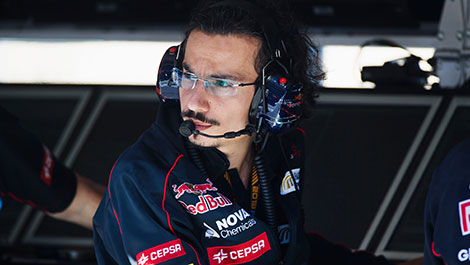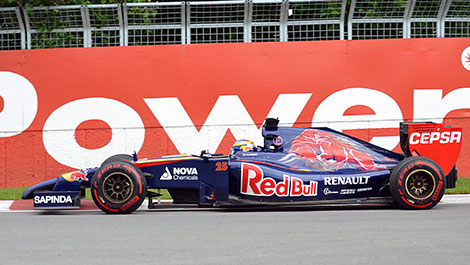Jun
12th
Stay connected Subscribe to our RSS feed
Since the start of the 2014 season, Formula 1 fans have been complaining about a number of things including the muffled sound of the new V6 engines, slower speeds in corners, ugly-looking noses that resemble an anteater, and so on.
Did F1 bigwigs really have to impose such radical changes? What next? Auto123.com met with Laurent Mekies, chief engineer at Scuderia Toro Rosso, to find some answers to these burning questions.
Auto123.com: The winter tests were disastrous, with teams struggling to complete back-to-back laps. Why did you run into so much trouble?
Laurent Mekies: Actually, we expected to face even more problems than we did. These technical changes really are a major evolution. Yet, in Melbourne, nearly all cars finished the race. Since then, none had to retire due to battery trouble. However, there were some issues with the power units, as well as handling and braking. Fortunately, there were no real mechanical or electrical breakdowns.
Auto123.com: You still have to take good care of your power units, since each driver only has five for the whole season...
Mekies: Yes, we try our best to limit breakdowns. Cars retiring from a race is just part of the game, you know; otherwise we wouldn't call it “motorsport”. From a technical standpoint, the shift from traditional V8 engines to turbocharged, hybrid V6s is fabulous and the right way to go. This allows the top automakers to compete in F1.
For TV viewers, the different sound and slower speeds are barely noticeable. Historically, F1 has always kept evolving and adjusting. This isn't football (soccer) where the rules stay the same for 50 years.
Auto123.com: Was the dramatic rule change inevitable?
Mekies: The new rule was conceived with technology in mind, and not to make cars slower like we've seen in the past. We now have more technologically advanced, more environmentally friendly machines that will allow F1 to do what it's supposed to do, which is developing high-tech solutions.
Auto123.com: Right, but fans are complaining that the 2014 cars are slower than last year, maybe even slower than GP2 cars...
Mekies: From a competition standpoint, the change is super interesting. It has led to more passing manoeuvres, because teams have to manage energy throughout the race. And whether you like the new sound or not, for me it's a side issue. Make no mistake, though: Cars aren't slower because of the new power units, but rather because of a significant loss of downforce.
Auto123.com: What's the future for this new turbo hybrid engine?
Mekies: Such a major rule change is designed to last. We know we can always make cars faster from one year to the next. Performance inevitably keeps progressing, and that will happen with the turbo hybrid engines, too. The cars will go faster and faster as the power units become stronger and more efficient. We'll also regain some of the downforce we've lost.
Did F1 bigwigs really have to impose such radical changes? What next? Auto123.com met with Laurent Mekies, chief engineer at Scuderia Toro Rosso, to find some answers to these burning questions.
 |
| Laurent Mekies, Scuderia Toro Rosso (Photo: WRI2) |
Auto123.com: The winter tests were disastrous, with teams struggling to complete back-to-back laps. Why did you run into so much trouble?
Laurent Mekies: Actually, we expected to face even more problems than we did. These technical changes really are a major evolution. Yet, in Melbourne, nearly all cars finished the race. Since then, none had to retire due to battery trouble. However, there were some issues with the power units, as well as handling and braking. Fortunately, there were no real mechanical or electrical breakdowns.
Auto123.com: You still have to take good care of your power units, since each driver only has five for the whole season...
Mekies: Yes, we try our best to limit breakdowns. Cars retiring from a race is just part of the game, you know; otherwise we wouldn't call it “motorsport”. From a technical standpoint, the shift from traditional V8 engines to turbocharged, hybrid V6s is fabulous and the right way to go. This allows the top automakers to compete in F1.
For TV viewers, the different sound and slower speeds are barely noticeable. Historically, F1 has always kept evolving and adjusting. This isn't football (soccer) where the rules stay the same for 50 years.
 |
| Jean-Eric Vergne, Toro Rosso (Photo: René Fagnan) |
Auto123.com: Was the dramatic rule change inevitable?
Mekies: The new rule was conceived with technology in mind, and not to make cars slower like we've seen in the past. We now have more technologically advanced, more environmentally friendly machines that will allow F1 to do what it's supposed to do, which is developing high-tech solutions.
Auto123.com: Right, but fans are complaining that the 2014 cars are slower than last year, maybe even slower than GP2 cars...
Mekies: From a competition standpoint, the change is super interesting. It has led to more passing manoeuvres, because teams have to manage energy throughout the race. And whether you like the new sound or not, for me it's a side issue. Make no mistake, though: Cars aren't slower because of the new power units, but rather because of a significant loss of downforce.
Auto123.com: What's the future for this new turbo hybrid engine?
Mekies: Such a major rule change is designed to last. We know we can always make cars faster from one year to the next. Performance inevitably keeps progressing, and that will happen with the turbo hybrid engines, too. The cars will go faster and faster as the power units become stronger and more efficient. We'll also regain some of the downforce we've lost.
 |
| Daniil Kvyat, Toro Rosso (Photo: René Fagnan) |
 The latest auto news, reviews, prices, product and vehicle releases.
The latest auto news, reviews, prices, product and vehicle releases.